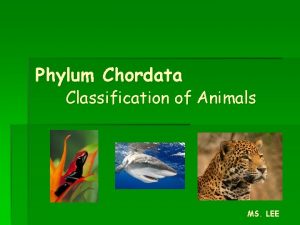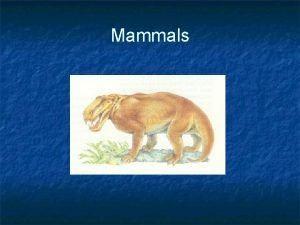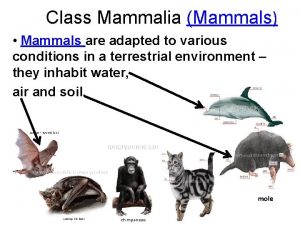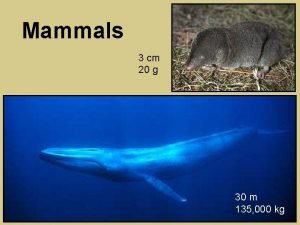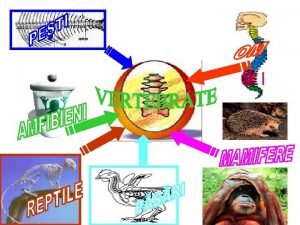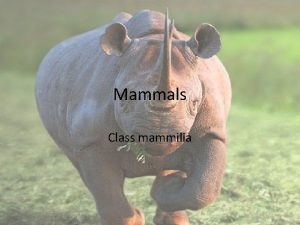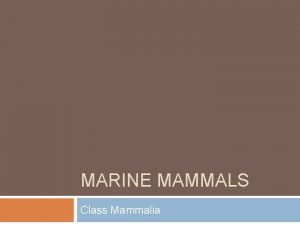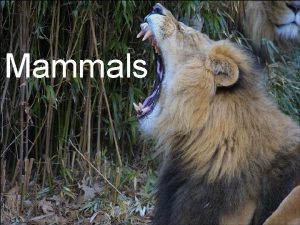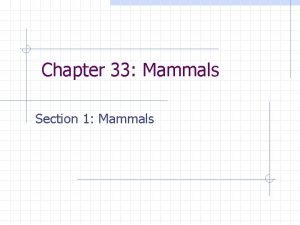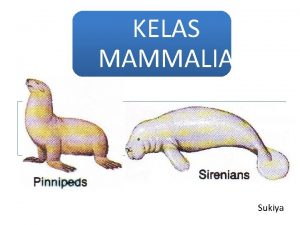KEY CHARACTERISTICS OF MAMMALS Zoology CLASS MAMMALIA 4
















- Slides: 16

KEY CHARACTERISTICS OF MAMMALS Zoology

CLASS MAMMALIA • 4, 400 species • Mammals • Classified into more than 20 orders, one of which includes humans. • Live on every continent and in every ocean • Some can fly • Some are exclusively aquatic

ENDOTHERMY • Like birds, mammals produce body heat internally through metabolism. • Keep their body temperature high and nearly constant by controlling their metabolism and regulating the loss of heat through the body surface.

HAIR • All mammals have hair. • Insulates the body against heat loss. • Most mammals (humans and whales are obvious exceptions) are covered with a thick coat of hair. • Hair color also serves to camouflage a mammal from predators or a predator from being seen by its prey.

COMPLETELY DIVIDED HEART • Like crocodiles and birds, mammals have a fourchambered heart with two completely separate ventricles. • Separate ventricles – keep deoxygenated blood from diluting oxygenated blood – allow more efficient pumping of blood through both circuits of the circulatory system.

MILK • Female mammals produce milk to feed their offspring. • Milk is a nutritious fluid that contains fats, protein, and sugars. • It is produced by the mammary glands, which are modified sweat glands located on the thorax or abdomen.

SINGLE JAWBONE • The lower jaw of a reptile is composed of several bones, but the lower jaw of a mammal is composed of a single bone. • This characteristic is particularly important for identifying mammalian fossils because many of the other characteristics of mammals, such as hair and mammary glands, do not fossilize or leave traces on the skeleton.

SPECIALIZED TEETH • Teeth in different parts of a mammal’s jaws are modified for different functions. • Front – biting, cutting, or seizing prey, • Along the sides – crushing, grinding, or slicing

CLASSIFICATION OF MAMMALS • Order Monotremata • Lay eggs • 2 examples: – Duckbill platypus (beaver x duck) – Echidna (anteater x porcupine) • Live in – Australia – New Guinea

CLASSIFICATION OF MAMMALS • Order Marsupiala • Babies mature in a pouch • Examples: – Kangaroo – Opossum (only one in the U. S. ) • Live in – Australia – New Guinea – North America

CLASSIFICATION OF MAMMALS • Placenta Mammals • Offspring are nourished inside the mother by a placenta – are then born live.

CLASSIFICATION OF MAMMALS • Order Rodentia • Two pairs of incisors grow continuously • Examples: – Squirrels – Beavers – Mice – Rats

CLASSIFICATION OF MAMMALS • Order Primates • Have grasping hands, well-developed brains, forward-facing eyes • Examples: – Monkeys – Apes – Humans

CLASSIFICATION OF MAMMALS • Order Carnivora • Claws, long canine teeth, and strong jaws – all for eating meat • Examples: – Dogs – Cats – Bears – Sea lions

CLASSIFICATION OF MAMMALS • Order Cetacea • Fish-shaped bodies with flippers, lack hind limbs, and have a flat tail • Examples: – Whales – Dolphins – Porpoises

CLASSIFICATION OF MAMMALS • Order Proboscidea • Long, boneless trunk • Example: – Elephants
 Toucans phylum
Toucans phylum Characteristics of mammals
Characteristics of mammals Class mammalia characteristics
Class mammalia characteristics Class mammalia characteristics
Class mammalia characteristics Transportin robustus
Transportin robustus Chapter 30 section 2 diversity of mammals
Chapter 30 section 2 diversity of mammals Class mammalia characteristics
Class mammalia characteristics Pelycosaurs
Pelycosaurs Animals without backbone
Animals without backbone Family leporidae kingdom
Family leporidae kingdom Classis mammalia
Classis mammalia Mammalia subclasses
Mammalia subclasses Subincrengatura vertebrata
Subincrengatura vertebrata Marine mammal characteristics
Marine mammal characteristics Characteristic of
Characteristic of Characteristics of a whale
Characteristics of a whale Section 32-1 introduction to the mammals
Section 32-1 introduction to the mammals
